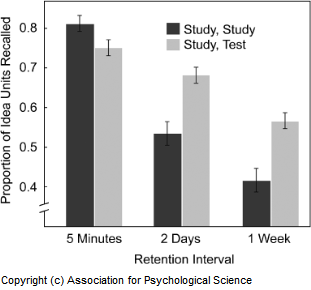Do tests help you learn?
By Debra Malpass
Published 31 Jan 2013
Critics have denounced regular exams and classroom testing as encouraging 'teaching-to-the-test' and shallow, rote learning. But there is mounting evidence that taking tests can in fact improve recall, and help students apply existing knowledge to new contexts and situations.
The testing effectA phenomenon known as the 'testing effect' shows that taking a test improves people's later recall of information they have studied. For example, in a study by Henry L. Roediger and Jeffrey Karpicke, students had to either re-read a passage (the 'study' group) or recall what they could remember from the passage (the 'test' group). Students then took the same test five minutes, two days or one week later.
After five minutes, the study group could recall slightly more than those in the test group. But two days later, this had reversed. Now students in the test group could remember more than those in the study group (see the graph below). The same was true when students re-took the test after a week.
Results from Roediger and Karpicke's study of the testing effect
The testing effect has been found when learning all kinds of information: words from another language, locations on a map, events from US history. But learning is more than just remembering facts. It also involves applying what you have learnt to new situations, often outside the classroom. This 'learning transfer' is one of the most important aspects of education. Research reveals that taking a test can help with this too.
Andrew Butler gave students a one thousand word passage about how bats use sound waves to navigate and hunt their prey. Students who repeatedly tested themselves had better recall on this topic than those who simply re-read the passage. Butler later gave students a test on a different but related topic that they hadn't studied submarine sonar and found that students in the repeat testing group answered more questions correctly than those in the re-study group. The students in the testing group were more able to correctly recall information they had learnt about sound waves and apply it to a related topic.
Testing and revisionThe testing effect suggests that it would be helpful to encourage students to test themselves during revision sessions. Unfortunately, most students tend to spend time re-studying material rather than testing themselves. Re-reading tends to make students feel more familiar with a text and gives the illusion of improved learning and recall, when in fact they are losing out on the benefits that the testing effect seems to offer.
Students may be reluctant to self-test because immediately after studying one can often only recall a few things correctly, and 'failing' a self-imposed test may make students feel discouraged or that the approach isn't working. However, as Roediger and Karpicke's study illustrates, testing can lead to better recall in the longer-term.
While the testing effect has implications for approaches to learning, most studies have compared testing with either no study or with students re-studying material. We also don't know whether the effect holds true for high stakes tests like GCSEs, or is more relevant in classroom settings to encourage students' progress during the year. The existing research certainly doesn't seem to suggest that students would only benefit if testing took place solely in high stakes, exam settings.
Future research comparing testing with other learning strategies, such as making revision notes or completing practice problems, would be helpful in establishing the most effective way to learn. More studies with school-age pupils rather than undergraduate students would also be useful, and under realistic classroom conditions rather than controlled lab-based settings. Once we have more readily applicable research findings, we'll be able to see whether the testing effect survives in the real world.
Debra Malpass
References
Butler, A. C. (2010). Repeated testing produces superior transfer of learning relative to repeated studying. Journal of Experimental Psychology: Learning, Memory, & Cognition, 36, 1118-1133. Retrieved 24 January 2013.
Carpenter, S. K., & Pashler, H. (2007). Testing beyond words: Using tests to enhance visuospatial map learning. Psychonomic Bulletin and Review, 14, 474 478. Retrieved 24 January 2013.
Carpenter, S. K., Pashler, H., & Cepeda, N. J. (2009). Using tests to enhance 8th grade students' retention of US history facts. Applied Cognitive Psychology, 23, 760-771. Retrieved 24 January 2013.
Karpicke, J. D., Butler, A. C., & Roediger, H. L. (2009). Metacognitive strategies in student learning: Do students practise retrieval when they study on their own? Memory, 17(4), 471-479. Retrieved 24 January 2013.
Koriat, A. & Bjork, R. A. (2005). Illusions of competence in monitoring one's knowledge during study. Journal of Experimental Psychology: Learning, Memory & Cognition, 31, 187-194. Retrieved 24 January 2013.
Pashler, H., Rohrer, D., Cepeda, N. J., & Carpenter, S. K. (2007). Enhancing learning and retarding forgetting: Choices and consequences. Psychonomic Bulletin and Review, 14, 187 193. Retrieved 24 January 2013.
Roediger, H. L., & Karpicke, J. D. (2006). Test-Enhanced Learning: Taking Memory Tests Improves Long-Term Retention. Psychological Science, 17(3), 249 255. Retrieved 24 January 2013.
Keywords
Related content
About our blog
Discover more about the work our researchers are doing to help improve and develop our assessments, expertise and resources.
Share this page
Connect with us
Email: research@aqa.org.uk
Work with us to advance education and enable students and teachers to reach their potential.